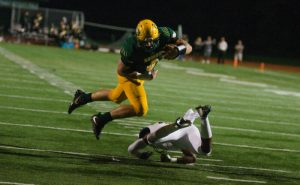Civics studies classes introduce students to politics
March 21, 2022
One of the key questions RBHS Civics Studies classes ask is “What makes an effective citizen?” From this question stems seemingly endless avenues of discovery, from researching the past to analyzing the present. Civics is a unique class because it serves as an opportunity to be the first class which introduces students to politics and, more importantly, the politics of the present.
Both teachers and students have difficult jobs when faced with teaching or learning politics. Teachers must give their students the tools they need to succeed as a citizen and help them learn how to think about and analyze the situations of the real world. This can be especially daunting because the class is created for freshmen, which Civics Studies teacher Debra Perry said is an ongoing debate in the district as some of the concepts within the class are very challenging.
“I think just helping fourteen year olds and fifteen year olds to really see how important [being an effective citizen] is,” Perry said. “To see and feel empowered, because how many fourteen and fifteen year olds feel empowered, right? So to create a classroom and experiences where they can walk away feeling that they can make a difference and they can understand many of these concepts–I think that is one of the most challenging things.”
Students also have a daunting task, as they are asked to understand the complex world of politics. They are also encouraged to participate in the community to become a more effective citizen and productive members of society which can feel difficult as a freshman.
Some–like freshman Reid Fairlamb–see the class as less of a challenge, but still feel the class has sparked a greater interest in the world around them.
“Civics has made me more interested in the political world and just what’s going on in the world in general,” Fairlamb said. “I now read the news fairly often and am interested in world affairs.”
Freshman Claire Beucke said Civics Studies has helped her to be more aware of the situations in the world that are currently happening, which is preparing her well for the future.
“I love Civics and it is one of my favorite classes,” Beucke said. “Mostly because I’m learning things that are important to know.”
In many classes, students memorize information for a test before discarding it later. Yet in Civics Studies, most of the content is centered around real world situations and how to help a community grow. This poses a unique struggle for teachers, as they must find a medium that most effectively teaches difficult concepts with the hope that the result is a greater understanding. These results, Perry said, are the most encouraging part of teaching Civics Studies.
“I think opportunities for students are the most important,” Perry said. “For them to rise and be thoughtful individuals versus me telling them what to think, because that doesn’t work anyway. We say here is what we’ve created. Can you understand, ‘How does it work?’ Then can you provide [the students] with opportunities to have many examples and to see the different ways that it works out.”
The purpose of Civics Studies is to produce productive and informed citizens. Both teachers and students alike face unique challenges they must rise to for their journey as members of society to be complete, yet both seem eager and willing to take on the challenge.
“I think social studies as a discipline is to help the individual become more right,” Perry said. “I think when [America] decided to jump into this republic, we made a commitment to the individual being able to understand themselves, and the community and to the outside world.”
How do you feel about civics studies and how it is taught? Let us know in the comments below.


















































































